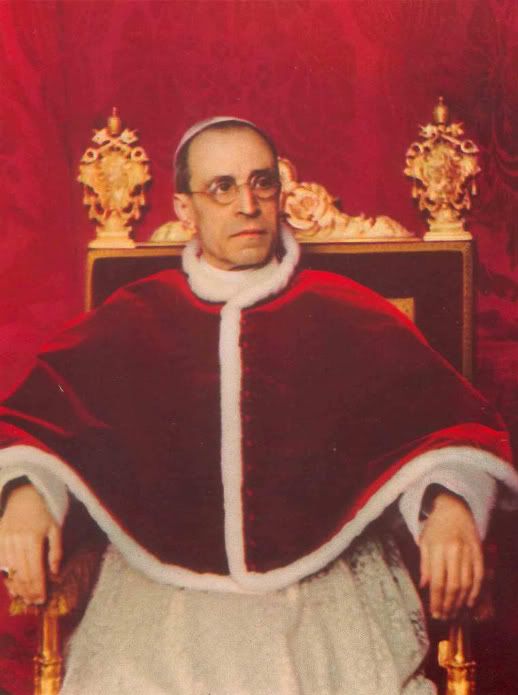Today is the 50 th Anniversary of the Death of Pope Pius the XII. THe Pope had a special Mass and Homily and of course there is controversy. As soon as the Pope full remarks come out I will Post them. I shall be doing a few other posts on Pope Pius the XII today.
Here is the Vatican News Papers' Op Ed Today on Pope Piux the XII
In memory of Pius XII
Here is the Vatican News Papers' Op Ed Today on Pope Piux the XII
In memory of Pius XII
Editorial by Giovanni Maria Vian
In the first hours of Thursday, October 9, 1958, half a century ago, Pius XII passed away. Death came after a long and intermittent illness, as he was about to complete the twentieth year of his pontificate, a great and difficult one which encompassed the darkest time of the twentieth century - the affirmation of totalitarianisms, of the extermination of the Jewish people in the heart of Europe, of the most horrifying war the world had ever known, and the subsequent division of the world in two camps diametrically opposed in a Cold War.
The Roman Pope, whose tall hieratic figure had become familiar to the whole world, thanks to the new means of communications, died in nocturnal solitude at the papal residence in Castel Gandolfo, betrayed by his own doctor who ignobly sold pictures of his agony.
Eugenio Pacelli was born on March 2, 1876, in a Rome that had recently become Italian [i.e., part of the new unified Italian state], while the long Pontificate of Pius XI was ending. As a young priest, he entered the service of the Holy See, following his Roman family's tradition. From then on, his life became increasingly linked closely to the Church of Rome, to pontifical diplomacy, and to his works of peace - first in various Vatican offices; then at the Nunciature in Germany during that dark time following the Communist Revolution in Russia when National Socialism was born and matured; and then finally, for good, back to Rome.
He became the Cardinal Secretary of State for Pius XI, and was subsequently elected his successor in 1939 following a very brief Conclave - the first Roman in two centuries (and the first Vatican secretary of state) to become Pope. A man of peace, Pius XII soon found himself a wartime Pope, the helpless Bishop of Rome.
But he faced the tragedy of war as no other leader in his time did. In the face of the monstrous persecution of Jews by the Nazis [and their Italian Fascist allies], he was constrained to a deliberate but pained silence to mask and maximize an indisputable work of assistance and charity to potential victims.
Cardinal Giovanni Battista Montini (later Pope Paul VI) would write in The Tablet, commenting on the worldwide denigration campaign against Pius XII launched by a German play about his wartime activities: "An attitude of condemnation and protest [towards Nazi treatment of the Jews], which this play claims the Pope never adopted, would have been - besides being futile - dangerous: that is all."
The government of the Church had to go on. It must be remembered, for instance, Divino afflante Spiritu, the encyclical which authorized the renewal of Biblical studies by Catholic scholars, was published during the war. His work of peace and leadership of Catholicism continued tirelessly during the war, expressed symbolically by the Holy Year at mid-century - when he proclaimed the dogma of the Assumption of Mary - and by the two great consistories which started the internationalization of the College of Cardinals for a Church that was increasingly global, while important reforms proceeded in doctrinal, liturgical and ecumenical areas.
At the same time, the Pope supported both democracy and opposition to Communist totalitarianism, on the one hand, and on the other, the reconstruction of Europe. The weight of the war and the desire to erase memories of it soon fell on the image of Pius XII and facilitated the spread after his death of a black legend - that of a Pope who was insensitive to the Holocaust or worse, as a Nazi sympathizer, a fabrication that is inconsistent with history even more than it is denigratory. Analogously, the undeniable differences between him and his successor do not authorize - not even from a historical angle - an unfavorable comparison with John XXIII that was artificially constructed and which still weighs on the Church, undermining its continuity - the same Church that Pius XII served to the very end and which has the duty to uphold his memory.
















1 comment:
this is your problem post causing the layout problem in Firefox ...
Post a Comment